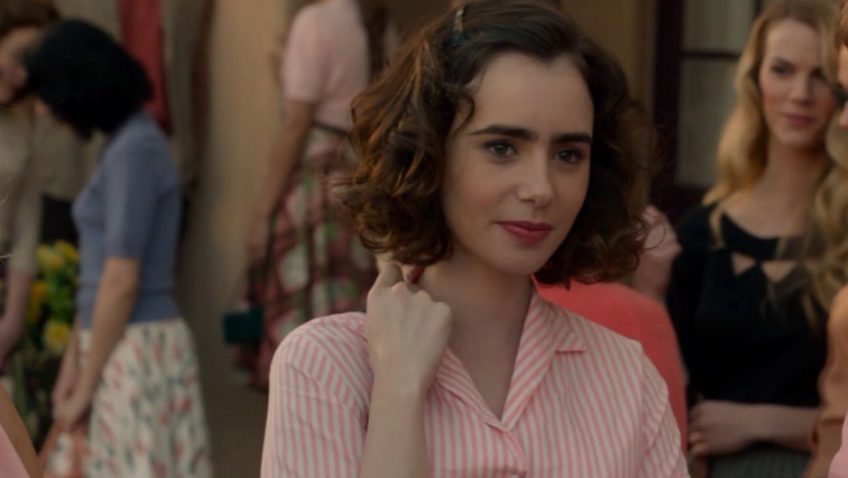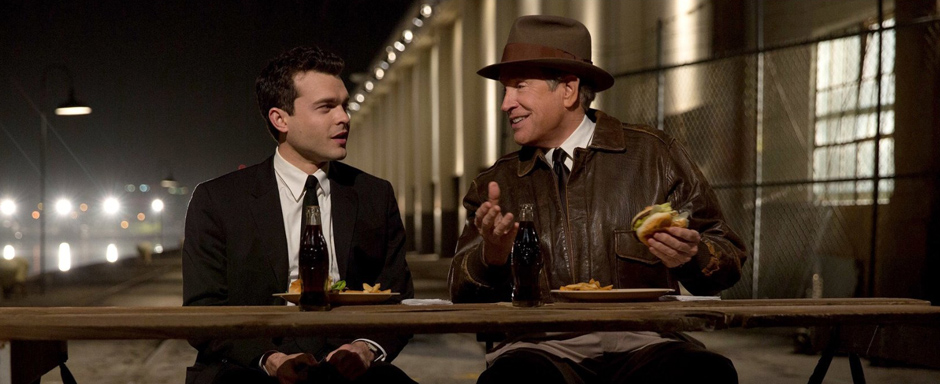Joyce Glasser reviews Rules Don’t Apply (April 21, 2017) Cert. 12A, 127 min.
‘Howard, I’m finding it very hard to run your companies without ever having seen you,’ moans Frank Maheu (Alec Baldwin) in Rules Don’t Apply. Come to think of it, we haven’t seen 79-year-old Warren Beatty, (Shampoo, Bonnie and Clyde) for fifteen-years – since his 2001 role in Town and Country. Beatty, infamous as a lady killer finally domesticated by Annette Bening (who appears in this film) has the honour of being the only person to have been nominated for an Academy Award for best film, best director, best actor, and best adapted screenplay in the same year on two occasions (for Reds and Heaven Can Wait). If he were aiming for a hat trick here, he has failed. Though the film is slightly more rickety than its 79-year-old star, producer, script writer and director, Rules Don’t Apply
is still worth seeing: for Beatty’s performance, 72-year-old Caleb Deschanel’s cinematography, a strong supporting cast, heaps of atmosphere and Beatty’s trademark craftsmanship.
In 1964, Howard Hughes (Beatty), is hidden in a dark room in Acapulco, while Frank Forbes (brooding, rising star Alden Ehrenreich); now a key figure in Hughes’ inner circle, fellow former driver Levar Mathis (Matthew Broderick); and Nadine Henly (Candice Bergen) are nervously waiting for him to make a phone call to members of the press. We do not learn until much later in the film that the call is about a book written by Richard Miskin (Paul Schneider), who claims Hughes has remembered nothing that has happened in the last five years.
We then flash back to a blindingly sunny, pastel colour-drenched Los Angeles, 1958, where Frank, Hughes’ handsome, young, ambitious, clean-cut chauffeur, is sent to the airport to collect Marla Mabrey (Lily Collins), a Baptist beauty queen from the deep South, and her devout, strict mother Lucy (Annette Bening). Despite her religious background, Marla is an aspiring actress is under contract with Hughes film and entertainment company, RKO. She is paid $400 a week for sitting around in a luxurious grace and favour home with a view of the Hollywood Bowl. But a certain amount of humiliation goes with the perks, including the ritual of grabbing for her pay cheque ‘like bait from a hook.’
In addition to the humiliation, there is the loss of freedom. Hughes owns his girls, and strict rules do apply, one of which is that the starlets are prohibited from dating anyone on the payroll, including the handsome driver, Frank. Marla is nonetheless over the moon, confident that she will soon meet her boss and become a film star.
But as Marla finds out, she is not alone. There are some 30 ingénues in Hughes’ stable and none of them have yet to see Hughes. Lucy eventually returns home to Virginia and Marla forms an increasingly close relationship with off-limits Frank.
Frank confides to Marla that even he has never seen Hughes (although that will soon change) and she confides to him that she has doubts about her future in Hollywood. ‘I can write songs and be sexy, but I can’t sing them,’ she laments. Frank reassures her: ‘You’re an exception. The rules don’t apply.’ Marla then writes a pretty average song with that title which she sings miserably. Whether or not this whole song business is a reference to Lilly Collins’ famous father Phil Collins, remains open for debate, but it has little relevance to the story.
Eventually Hughes and Marla do meet in a beguiling scene in which Marla is impressed by Hughes, who, though not paying much attention to her, promises to arrange her long awaited screen test. In the meantime, Hughes’ loyal, trusted Noah Dietrich (Martin Sheen) advises Hughes to see a doctor for his odd behaviour – of which there is ample evidence in the film. The bankers are considering ways to limit their risk by taking over his business. When he asks what he needs to do legally to avoid being committed and losing his company, the answer is marriage. One night, Marla gets drunk enough to seduce Hughes and enter into a shaky marriage pact.
For Beatty, Rules Don’t Apply might be a nostalgic, semi-autobiographical trip back to the early 1960s when he burst on the scene with Splendor in the Grass. For younger audiences, it will be a wild time-travel trip with the four-time nominated actor. It’s just a shame that Beatty (who devised the story with one of Hollywood’s greatest script writers, Bo Goldman) could not see through all his hats that there are four stories here, and multiple points of view.
First is the story of 1950s-1960s Hollywood and Hughes’ RKO pictures. Then there’s the related story of the aspiring actress from a sheltered home who gets herself engaged to Hughes. Third is the story of the Methodist chauffeur who rises to become an advisor to the richest man in America, but falls in love with one of his forbidden starlets. But Hughes is not the only obstacle to true love. There’s even a scene in which Frank returns home to see his Methodist fiancée Sarah (Taissa Farmiga) and her parents (Amy Madigan and Ed Harris). Paralyzed by his strong sense of responsibility and guilt, he can’t bring himself to tell the family about Marla.
Then there’s the problematic fourth strand to the film: the biopic of Howard Hughes. Hughes was 53 when the events referred to in the film occurred and Beatty is 79. Beatty might well have made a better Hughes than Leonardo DiCaprio, but if he has missed the boat by his age, he has missed the opportunity too. Martin Scorsese’s The Aviator, released in 2004, was nominated for 11 Academy Awards and won 5.
Then again, you can say that Beatty’s shambolic script mirrors the mind of the eccentric billionaire. And, with that seductive twinkle still in his eye, Beatty is the best thing in this lavishly produced, star-studded, nostalgic failure.
You can watch the film trailer here:






